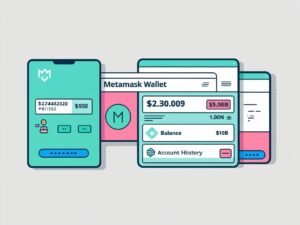A crypto wallet is a digital tool for securely storing and managing cryptocurrencies. It works by holding public and private keys, allowing users to send, receive, and monitor their digital assets. Crypto wallets can be categorized as hot wallets, which are connected to the internet for frequent transactions, and cold wallets, which are stored offline for greater security. Effective management of private keys and regular updates are essential for maintaining safety. Further details provide deeper insights into wallet functionalities.

As the popularity of cryptocurrencies continues to grow, understanding crypto wallets becomes fundamental for anyone looking to participate in this digital economy. A crypto wallet is a digital tool designed for storing and managing cryptocurrencies. It holds both public and private keys that enable users to send, receive, and monitor their crypto assets. In essence, it acts as an interface between users and blockchain networks, making it imperative for engaging with the cryptocurrency ecosystem.
There are various types of crypto wallets available, each serving different needs. Hot wallets are connected to the internet and can be software, mobile, or web-based. These are convenient for frequent transactions but may be less secure. Cold wallets, on the other hand, offer offline storage and include hardware wallets or paper wallets, providing enhanced security. Cryptocurrencies are not stored in wallets; they are bits of data found on a blockchain, which underscores the importance of understanding how wallets function. Private key management is critical for ensuring the security of crypto assets, and users should adopt strong encryption methods to protect their keys. Additionally, users should be aware that cold wallets provide superior protection against online threats compared to hot wallets.
Users can choose custodial wallets, where a third party manages private keys, or non-custodial wallets, where individuals maintain control over their own keys. Multi-signature wallets require multiple approvals for transactions, adding an extra layer of security.
Key components of a crypto wallet include public keys, which serve as shareable addresses for receiving funds, and private keys, which are secret codes necessary for authorizing transactions. A seed phrase is also important, as it consists of backup recovery words that allow users to regain access to their wallet if needed.
The user interface of the wallet software helps manage crypto assets efficiently while integrating with various blockchain networks.
Security features play a significant role in protecting wallet data. Encryption safeguards against unauthorized access, while two-factor authentication and biometric authentication enhance protection. Regular software updates and backup of seed phrases are best practices that users should adopt.
Frequently Asked Questions
Can I Use a Crypto Wallet for All Cryptocurrencies?
A crypto wallet cannot be used for all cryptocurrencies. Most wallets support major coins like Bitcoin and Ethereum, while others may only accommodate specific currencies.
Multi-currency wallets offer broader options, but some wallets are limited to a single cryptocurrency. Compatibility with blockchain networks and ongoing software updates also affect which cryptocurrencies can be stored.
Consequently, users must research wallet capabilities before selecting one to guarantee it meets their needs for various digital assets.
How Do I Recover a Lost Crypto Wallet?
To recover a lost crypto wallet, individuals should first check for backups on devices, cloud storage, or paper copies of seed phrases.
If no backups are found, they can utilize recovery tools, such as wallet recovery services or data recovery software.
Contacting the wallet provider’s customer support or seeking help from crypto forums may also be beneficial.
Finally, implementing preventative measures, like secure backups and two-factor authentication, can help avoid future losses.
Are Crypto Wallets Safe From Hackers?
Crypto wallets are not entirely safe from hackers, as vulnerabilities exist. Common risks include phishing attacks, malware, and exchange hacks.
Security measures, such as encryption of private keys, two-factor authentication, and hardware wallets, enhance safety. However, users must remain vigilant by using strong passwords, educating themselves about scams, and regularly updating their security practices.
While no system is foolproof, implementing best practices greatly reduces the likelihood of a successful hack.
Do I Need a Wallet for Every Crypto Transaction?
Not every crypto transaction requires a personal wallet. Some exchanges and custodial services can hold cryptocurrencies for users, while peer-to-peer transactions typically necessitate wallets for both parties.
Additionally, crypto ATMs and certain platforms allow purchases or transfers without needing a dedicated wallet.
However, using a personal wallet offers benefits like full control over assets and enhanced security, making it a preferred choice for many users engaged in crypto transactions.
Can I Store NFTS in a Crypto Wallet?
Yes, NFTs can be stored in various types of crypto wallets.
Hot wallets, like mobile or web wallets, allow easy access and management of NFTs. Cold wallets, such as hardware devices, offer enhanced security by keeping NFTs offline.
Popular wallets that support NFT storage include MetaMask, Trust Wallet, and Ledger.
It is essential to verify that the chosen wallet supports specific NFT token standards and to maintain security practices, such as backing up seed phrases.
References
- https://www.investopedia.com/terms/b/bitcoin-wallet.asp
- https://www.zimperium.com/glossary/crypto-wallet-security/
- https://money.com/best-crypto-wallets/
- https://www.arkoselabs.com/explained/guide-to-cryptocurrency-security/
- https://www.techtarget.com/searchsecurity/definition/crypto-wallet-cryptocurrency-wallet
- https://www.debutinfotech.com/blog/crypto-wallet-security-complete-guide
- https://www.bankrate.com/investing/what-is-a-crypto-wallet/
- https://www.blockchain-council.org/blockchain/types-of-crypto-wallets-explained/
- https://join1440.com/topics/bitcoin/a/understanding-the-basics-of-cryptocurrency-wallets
- https://www.tastylive.com/concepts-strategies/types-of-crypto-wallets









